Looking
at the current scenario, this January I remembered Mir Saheb more
than ever. Almost sixteen years have elapsed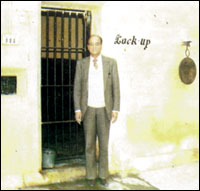 since Mir Khalil-ur-Rahman,
the founder and editor-in-chief of 'Jang' and other Jang Group publications
left us for his heavenly abode. since Mir Khalil-ur-Rahman,
the founder and editor-in-chief of 'Jang' and other Jang Group publications
left us for his heavenly abode.
Unlike the other press barons and owners of newspapers, Mir Saheb
was not just the owner of his newspaper but was also a full-fledged
journalist and a working editor. Being the owner, chairman and an
editor he was fully aware of the potential and worth of each and every
journalist, para- journalist and also the non-journalists employed
by his company. He kept an eye on the performance of his staff, so
that no one suffered or unjustifiably benefited due to inaccurate
evaluation of their performance. He would himself judge and evaluate
every new entrant.
Out of more than four decades of my journalistic career, I spent almost
sixteen years under the guidance of Mir Saheb. Although I did not
work directly under him, still I learned a lot about journalism and
life management in general, under his guidance.
Mir sahib was of the opinion that a journalist should not only be
concerned with reporting and writing but should be aware of all the
other facets of journalism. In this regard, Mir saheb, himself, was
well versed with all the areas of journalism and took an active part
in all activities, from translation to radio monitoring, editing to
reporting, proof reading to copy pasting, editorial writing to writing
headlines.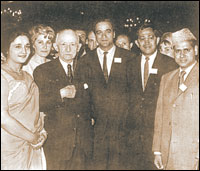
After the debacle of East Pakistan, Pakistan People's Party came to
power and its chairman Zulfiqar Ali Bhutto, who later became the President
and then Prime Minister of Pakistan, took out a procession that culminated
at Kakri ground where a large public meeting was held late after midnight.
Mir sahib himself traveled with the procession and narrated the whole
story in his report. During the journey to the Kakri ground Mr Bhutto
addressed the gathering quite a few times but the final speech was
delivered at the Kakri ground in Lyari. It was no surprise that the
next morning 'Jang' was the only newspaper that carried the news about
the procession along with important announcements from Mr Bhutto's
speech.
Mir Saheb dedicated approximately four decades of his life to journalism.
Although he was the owner of the paper and was not answerable to anyone,
yet he would come to the office early around 11 am and would remain
'on duty' till 2 am. After that he would be available on the phone
till after the final copy was sent to the press. Even at 3 am in the
night he used to pick up the phone at the second or third ring. While
at office, he remained in touch with different stations of 'Jang'
and monitored various radio news bulletins himself.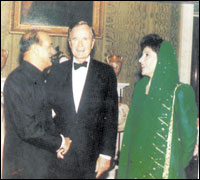
When I was night shift incharge in Jang Karachi I did not remember
a single instance when I phoned him at midnight at his residence and
did not get a reply with first or second ring. He always called the
night incharge after eleven in the night to find out about the latest
news. He would directly phone the night shift incharge as he knew
that the creed landed at night desk.
Decades back when there were not many telephones in the office and
the one in the office developed some fault. He tried but failed to
contact me. He made enquiries at the telephone exchange and was informed
that there is nothing wrong in the switch room and there might be
a break in the line in the office and a line man would be sent to
check the problem in the morning. Upon hearing this, Mir sahib immediately
drove to office and entering newsroom asked me about the phone.
When I told him that a complaint had already been made he said, "Humayun
Saheb what type of journalist you are? You cannot fix a phone line?"
With this remark he knelt down and went on to check the wiring himself.
After about ten to twelve minutes he found the broken wires and joined
them back after which the phone started working. This incident taught
me a great lesson that I should also develop a technical know-how
in order to perform my day-to-day duties effectively.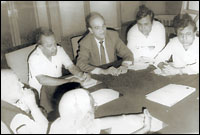
Mir Saheb was very keen to get exclusive stories for 'Jang' and went
an extra mile to get it. .As I stated earlier that he himself covered
Bhutto Saheb's procession for the sake of exclusivity and therefore,
'Jang' was the only newspaper to publish the story the same 'morning'
as the public meeting ended almost in the early hours of the morning.
The news about Bhutto's execution was also published in the regular
issue of 'Jang' and it must be mentioned here that the famous BBC
reporter, Mark Tully was in the capital with other renowned foreign
correspondents to cover Bhutto's execution, but on a local level 'Jang'
was the only newspaper which published this story the same morning,
while others had to publish special supplements. Earlier when general
Zia-ul-Haq, Chief of Army Staff, deposed Prime Minister Z A Bhutto
and took over, it was again 'Jang' that gave this story in its regular
issue the same morning while other newspapers had to publish supplements.
Throughout these events Mir Saheb personally supervised the reporters
and journalists covering the events and remained awake until the paper
was printed and delivered to the hawkers.
The word "rest" or "leisure" were not in Mir saheb's
dictionary. He believed in hard work and worked for fifteen hours
everyday. Back then Eid used to be the only official holiday, but
later APNS put forward a proposal for two holidays on Eid which was
supported by Mir Saheb so that he too could get some rest.
Through his untiring hard work and constant struggle Mir sahib not
only made 'Jang' Pakistan's largest and greatest newspaper but also
the largest Urdu newspaper of the world.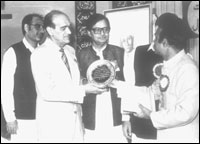
Mir Khalil-ur-Rahman
received a number of awards for his outstanding services in the
field of journalism
1978 - Gold Mercury International Award, Mexico
1983 - Merchant Navy Officer Award
1985 - Writers Forum Award
1985 - Iqra Award
1985 - Baladi Award, the UAE
1987 - Nishan-e-Behbood
1987 - Pakistan Movement Award
1987 - Quaid-i-Azam National Award
1988 - Honourary degree of Ph D, Sri Lanka
1989 - Performance Award
1989 - Quli Qutub Shah Aalami Award (given at International Urdu
Conference), New Delhi
1990 - Art International Award (Best editor-in-chief award), Dubai
|

